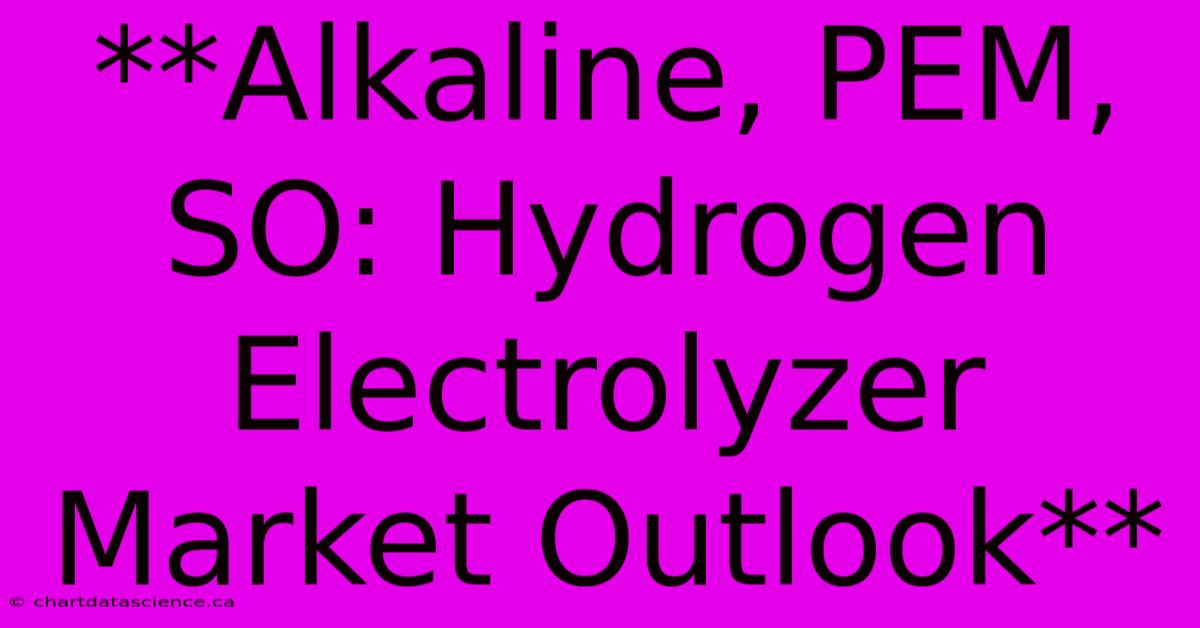**Alkaline, PEM, SO: Hydrogen Electrolyzer Market Outlook**

Discover more detailed and exciting information on our website. Click the link below to start your adventure: Visit My Website. Don't miss out!
Table of Contents
Fueling the Future: A Deep Dive into the Hydrogen Electrolyzer Market
The world's hungry for clean energy, and hydrogen is looking like a real contender. But how do we get this clean-burning fuel? Enter the hydrogen electrolyzer, a fancy name for a machine that splits water into hydrogen and oxygen using electricity. Pretty neat, right?
Types of Electrolyzers: A Quick Breakdown
We're not talking about one-size-fits-all here. There are a few main players in the electrolyzer game:
1. Alkaline Electrolyzers: Think of these as the workhorses, reliable and proven. They've been around for decades, using a potassium hydroxide solution to split water. They're cheap to produce, but they're not the most efficient.
2. Proton Exchange Membrane (PEM) Electrolyzers: These guys are the high-performers. They use a proton exchange membrane to separate hydrogen and oxygen, working at high pressure and efficiency. They're perfect for smaller applications, but they're a bit pricier than alkaline electrolyzers.
3. Solid Oxide (SO) Electrolyzers: These are the newcomers, still under development. They operate at high temperatures, which means they're even more efficient. But they're also the most expensive and complex to manufacture.
Market Outlook: A Bright Future?
The hydrogen electrolyzer market is booming. We're talking about a global market expected to reach $10 billion by 2027, according to some forecasts. Why the hype?
- Clean Energy Demand: With the world shifting towards renewable energy, hydrogen is looking like a key player.
- Government Support: Countries are pouring resources into developing hydrogen infrastructure, pushing the market forward.
- Falling Costs: As technology advances, the cost of producing electrolyzers is dropping, making them more accessible.
Challenges to Overcome
It's not all sunshine and rainbows. The hydrogen electrolyzer market still faces some challenges:
- Scaling Up Production: Meeting the growing demand will require massive investments in production capacity.
- Cost Reduction: Further cost reductions are needed to make electrolyzers more competitive with traditional energy sources.
- Hydrogen Storage and Distribution: Efficient and safe ways to store and transport hydrogen need to be developed.
Conclusion: A Promising Path Forward
The hydrogen electrolyzer market is in its early stages, but the potential is huge. With continued innovation and investment, these devices could play a crucial role in the transition to a cleaner energy future.
Let's be honest, we need to get off fossil fuels, and hydrogen electrolyzers are a big part of that solution. The future of energy is looking bright, and it's definitely going green!

Thank you for visiting our website wich cover about **Alkaline, PEM, SO: Hydrogen Electrolyzer Market Outlook**. We hope the information provided has been useful to you. Feel free to contact us if you have any questions or need further assistance. See you next time and dont miss to bookmark.
Also read the following articles
| Article Title | Date |
|---|---|
| Nobel Laureates Life Sciences Role In Humanity | Oct 21, 2024 |
| Browns Watson Ruled Out Against Bengals | Oct 21, 2024 |
| Russell Wilson Powers Steelers Past Jets | Oct 21, 2024 |
| Texas Georgia Game Fan Conduct Statement | Oct 21, 2024 |
| Alabama Drops In Ap Poll After Tennessee Loss | Oct 21, 2024 |
